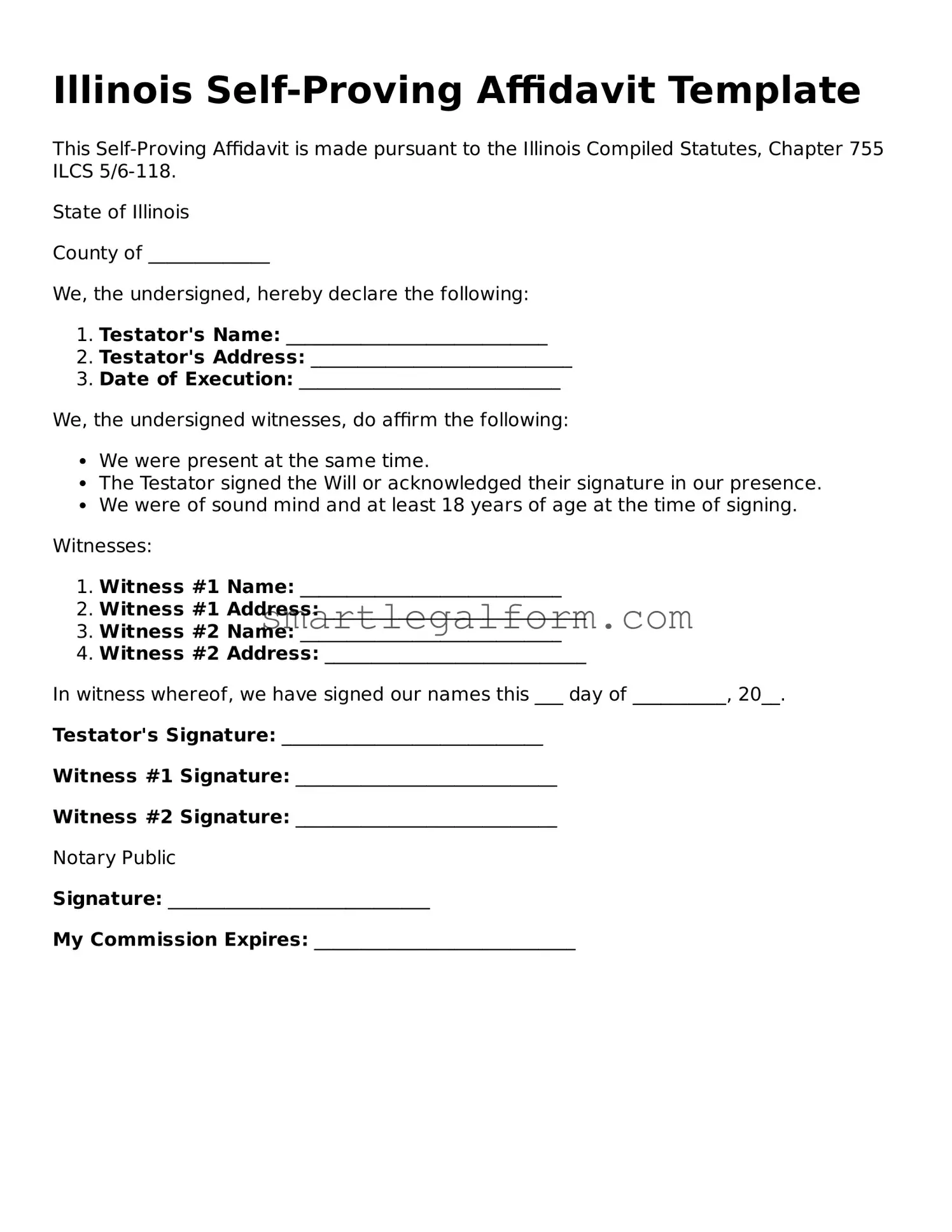Printable Illinois Self-Proving Affidavit Document
Form Preview Example
Illinois Self-Proving Affidavit Template
This Self-Proving Affidavit is made pursuant to the Illinois Compiled Statutes, Chapter 755 ILCS 5/6-118.
State of Illinois
County of _____________
We, the undersigned, hereby declare the following:
- Testator's Name: ____________________________
- Testator's Address: ____________________________
- Date of Execution: ____________________________
We, the undersigned witnesses, do affirm the following:
- We were present at the same time.
- The Testator signed the Will or acknowledged their signature in our presence.
- We were of sound mind and at least 18 years of age at the time of signing.
Witnesses:
- Witness #1 Name: ____________________________
- Witness #1 Address: ____________________________
- Witness #2 Name: ____________________________
- Witness #2 Address: ____________________________
In witness whereof, we have signed our names this ___ day of __________, 20__.
Testator's Signature: ____________________________
Witness #1 Signature: ____________________________
Witness #2 Signature: ____________________________
Notary Public
Signature: ____________________________
My Commission Expires: ____________________________
Common mistakes
Filling out the Illinois Self-Proving Affidavit form can be straightforward, but mistakes can lead to complications. One common error is failing to include all required signatures. Both the testator and witnesses must sign the affidavit. If any signature is missing, the document may not be valid.
Another frequent mistake is not providing the correct date. The date of signing is crucial for establishing the timeline of the will's execution. Make sure to write the date clearly and accurately to avoid confusion later.
Some individuals overlook the importance of identifying the witnesses correctly. Each witness must be of legal age and not a beneficiary of the will. Listing an ineligible witness can invalidate the affidavit.
Inaccurate personal information is also a common pitfall. Ensure that the names and addresses of the testator and witnesses are complete and correct. Mistakes in this section can lead to challenges in the future.
People often forget to include the self-proving clause. This clause is essential because it confirms that the will was executed in accordance with state laws. Without it, the affidavit may not serve its intended purpose.
Another mistake is neglecting to have the affidavit notarized. A notary public must witness the signing of the document. Without notarization, the affidavit may not hold up in court.
Some individuals do not keep copies of the completed affidavit. It is important to retain a copy for personal records. This ensures that you have proof of the affidavit's existence and its contents.
Failing to review the form for clarity and legibility is another common error. Handwriting should be neat, and all information should be easy to read. Illegible forms can lead to misunderstandings and disputes.
People sometimes rush through the process and miss important details. Take your time to read through the entire form carefully. A thorough review can help catch mistakes before submission.
Lastly, individuals may not seek assistance when needed. If unsure about any part of the process, consider consulting a professional. Getting help can prevent errors and ensure that the affidavit is filled out correctly.
Dos and Don'ts
When filling out the Illinois Self-Proving Affidavit form, it’s crucial to follow certain guidelines to ensure the document is valid and effective. Here’s a list of things you should and shouldn't do:
- Do: Ensure that the form is completed in the presence of a notary public.
- Do: Clearly identify the testator and the witnesses on the form.
- Do: Sign the affidavit in front of the notary after all parties have agreed.
- Do: Keep a copy of the signed affidavit with the will for easy access.
- Do: Review the form for accuracy before signing.
- Don't: Forget to have all witnesses sign the affidavit.
- Don't: Leave any sections of the form blank.
- Don't: Use outdated versions of the affidavit form.
- Don't: Assume that verbal agreements are sufficient; written signatures are required.
- Don't: Ignore state-specific requirements that may apply.
Other Self-Proving Affidavit State Forms
Florida Self Proving Affidavit - The document provides peace of mind for the testator's family.
Self Proving Will Affidavit - A Self-Proving Affidavit may be completed at the time of signing the will.
Texas Self Proving Affidavit - Can be a critical component of estate planning for individuals.
The Employment Application PDF form is a standardized document used by employers to collect essential information from job applicants. This form typically includes fields for personal details, work history, and qualifications. For more information on how to access this important resource, you can visit documentonline.org/blank-employment-application-pdf, which can help streamline the hiring process and ensure that both parties are aligned from the start.
Guardianship Authorization Affidavit California - It typically includes essential details like the testator’s and witnesses' names.
Similar forms
The Self-Proving Affidavit form shares similarities with several other important documents. Here are four of them:
- Last Will and Testament: Both documents are used in the estate planning process. A Last Will outlines how a person's assets will be distributed after their death, while the Self-Proving Affidavit serves to validate the will and confirm that it was executed properly.
- Power of Attorney: A Power of Attorney allows someone to make decisions on behalf of another person. Like the Self-Proving Affidavit, it requires signatures and often notarization to be considered valid and enforceable.
- Hold Harmless Agreement: This document is essential for individuals and businesses in Florida, providing protection against liabilities, as detailed on TopTemplates.info.
- Living Trust: A Living Trust is created to manage a person's assets during their lifetime and after their death. Similar to the Self-Proving Affidavit, it can help streamline the distribution of assets and may avoid probate.
- Affidavit: An Affidavit is a sworn statement made under oath. The Self-Proving Affidavit is a specific type of affidavit that verifies the authenticity of a will, making it a key part of the estate planning process.
